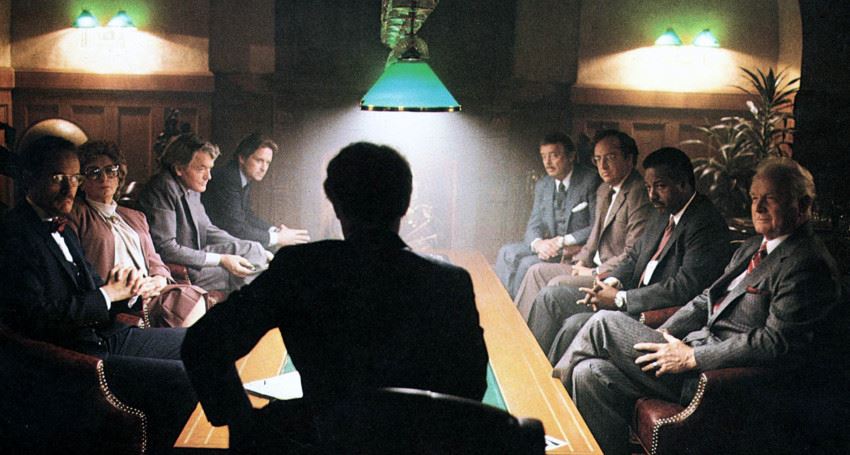The Star Chamber (1983)

I’m beginning to think that the only person that can be cast in the role of a cultish leader of a secret society of lawmakers that underhandedly twists the laws for his own devices is Hal Holbrook. Holbrook headed a group of renegade cops in Magnum Force. He heads a group of renegade judges here in The Star Chamber. He heads a group of renegade lawyers in The Firm. It seems no matter what slimy organization exists to subvert and twist the law for their own devices, Holbrook has to have his hand in it somewhere. Arrest this man now!
Michael Douglas stars as California Superior Court Judge Stephen Hardin, a judge struggling with the fact that he has to let knowingly guilty and dangerous criminals back on the streets because of some technicality in the laws governing the police acquisition of evidence. Hal Holbrook is his peer and mentor, Judge Ben Caufield, who invites him to do something about the guilty conscience he feels, by joining a secret society of judges that see to it that justice is exacted on the criminals that have gotten away through loopholes in the law. Hardin is uneasy about joining, but he’d rather see the criminals dead than kill other innocent people, so he submits. However, is it right to take the law into his own hands and advocate a death penalty himself, especially when the criminals haven’t had a fair trial to try for their innocence?
The Star Chamber provides provocative moral and ethical conflicts that deal with the tricky dichotomy of the justice system. On the one hand, the laws are there to protect innocent people from being exploited by anxious or overachieving police officers that will make up phony situations to see to it that some people are behind bars. On the other, the bar is sometimes set too high for law enforcement in the pursuit of criminals that they know to be guilty, and the criminals end up going free to commit more crimes simply because of some minor procedural problem that was out of their control. It calls into question whether or not laws should be followed if it means that the protection of the public is compromised.
As intriguing as all of these weighty issues are, The Star Chamber never really delivers on the ambitiousness of its initial premise. The situations where guilty people are turned free seem so egregious that it seems almost impossible to believe that a judge would toss a child killer back out on the street because the warrants for his arrest were no longer valid. But then again, I’m no lawyer, so perhaps these sorts of things actually do happen. I just question whether or not judges are more afraid that an appellate court will overturn their decision over whether or not the public becomes outraged that killers and child molesters are turned loose to commit more heinous acts.
The Star Chamber is a film of extremes in almost every sense thematically. In order to make points, the film’s creators showcase the worst case scenarios and then puts these into conflict with another set of extremes to counter them. It all becomes too hard to swallow for one movie, and when dealing with real issues about real problems, the overblown developments throw an anchor on this ambitious thriller that makes it more absurd than erudite.
Douglas, Holbrook, and Kotto do manage to turn in fine performances, while the dark look of the film by director Hyams manages to give this suspense drama a grim and scary ambiance that does make for a sense of eeriness. However, it all becomes unraveled when it turns into an action movie in the final third, where the intelligence of the set-up all but completely dissipates into noisy chase scenes and shootouts. Promising in theory, preposterous in execution.
Qwipster’s rating: C
MPAA Rated: R for violence, language, and drug references
Running Time: 109 min.
Cast: Michael Douglas, Hal Holbrook, Yaphet Kotto, Sharon Gless, James Sikking, Joe Regalbuto, Don Calfa, John DiSanti, DeWayne Jessie
Director: Peter Hyams
Screenplay: Roderick Taylor
